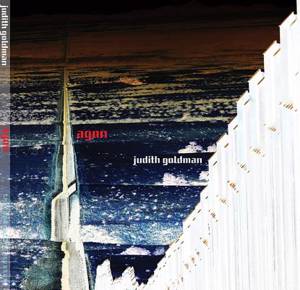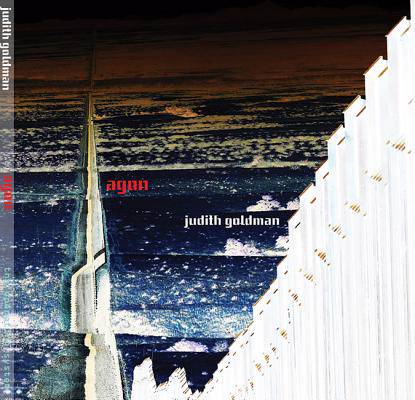
Bedankt voor het vertrouwen het afgelopen jaar! Om jou te bedanken bieden we GRATIS verzending (in België) aan op alles gedurende de hele maand januari.
- Afhalen na 1 uur in een winkel met voorraad
- In januari gratis thuislevering in België
- Ruim aanbod met 7 miljoen producten
Bedankt voor het vertrouwen het afgelopen jaar! Om jou te bedanken bieden we GRATIS verzending (in België) aan op alles gedurende de hele maand januari.
- Afhalen na 1 uur in een winkel met voorraad
- In januari gratis thuislevering in België
- Ruim aanbod met 7 miljoen producten
Zoeken
Omschrijving
Poetry. Literary Nonfiction. Hybrid Genre. In the tragi-comic--and worse--chaos of our times--suppose our writing began to appear as letters caught in barcodes. Phrases and bits of words breaking off en route to scanners designed for registering information but not the disturbance of meaning. It is, literally, with this provocative vision that Judith Goldman's AGON begins. Fragments--words with ing or ite or ppeals detached--mark the violence and folly of our weaponized and otherwise benighted cultures. At times, a necessary lyricism wells up without betraying the truth of 'Cumulative transfers By the 'agreed upon' price / the Temp, est has of late stripped the pe, tals away.' There's even more to this many-genred book--one to be lived with, in the urgency of its poetry, its philosophical and socio-political inquiry--font of brilliance that sustains vitally agonistic conversation across perilous divides.--Joan Retallack
The Commodification of Everything. That was the pivot point of materialist discourse not even five years ago. But now, it's time to crack open the piths of the most fundamental doings of our species. After the sweeping tide of ethnonational victories currently sweeping the globe, The Weaponization of Everything, is not merely the 'speak' of The Now, but the do of all its subjects, whether collusive or rebellious. Judith Goldman's AGON is borne amidst this new reality. Few works of experimental literature aim so high as to flush out the full range affectual coordinates as to reveal their age's Agon as a controlling demigod of our own making, that is, to raise up the Agon's 'agon'.--Rodrigo Toscano
Judith Goldman's AGON confronts the ubiquitous naturalization inherent in the weaponization of race, gender, global warming, poetics, language, utterance, politics, torture, immigration, and whatever else is changeable under the guise of aggression masquerading as mental freedom. '...the intensification of weapons already in place, ' and '...observed nearly everywhere, ' AGON deftly solders ideas of defensive assimilation (weapons already in place) to our conscious and unconscious activities of daily living. One can only bow down in shock and awe to AGON's scorched earth dissemination of open-ended spaces to think, while thinking is still, hopefully, under what we presume is our jurisdiction.--Kim Rosenfield
A cross-genre work that intercuts and assembles three textual threads, AGON inventories ubiquitous contemporary exempla of weaponization: in the culture propagated by neoliberalism, all social forms--ordinary, necessary relations, transactions, and communications--have been turned into fodder for social aggression. AGON audits the disavowed violence of abstractive technologies in their material effects, while also tracing the subtle anatomy of violence in its more proper spheres. Is poetry one of these? Writing alongside Amiri Baraka's invective Black Art, AGON builds a dossier on the aggressivity peculiar to literary speech, thinking this issue in relation to the volatile politics around poetry in America at this moment.
The Commodification of Everything. That was the pivot point of materialist discourse not even five years ago. But now, it's time to crack open the piths of the most fundamental doings of our species. After the sweeping tide of ethnonational victories currently sweeping the globe, The Weaponization of Everything, is not merely the 'speak' of The Now, but the do of all its subjects, whether collusive or rebellious. Judith Goldman's AGON is borne amidst this new reality. Few works of experimental literature aim so high as to flush out the full range affectual coordinates as to reveal their age's Agon as a controlling demigod of our own making, that is, to raise up the Agon's 'agon'.--Rodrigo Toscano
Judith Goldman's AGON confronts the ubiquitous naturalization inherent in the weaponization of race, gender, global warming, poetics, language, utterance, politics, torture, immigration, and whatever else is changeable under the guise of aggression masquerading as mental freedom. '...the intensification of weapons already in place, ' and '...observed nearly everywhere, ' AGON deftly solders ideas of defensive assimilation (weapons already in place) to our conscious and unconscious activities of daily living. One can only bow down in shock and awe to AGON's scorched earth dissemination of open-ended spaces to think, while thinking is still, hopefully, under what we presume is our jurisdiction.--Kim Rosenfield
A cross-genre work that intercuts and assembles three textual threads, AGON inventories ubiquitous contemporary exempla of weaponization: in the culture propagated by neoliberalism, all social forms--ordinary, necessary relations, transactions, and communications--have been turned into fodder for social aggression. AGON audits the disavowed violence of abstractive technologies in their material effects, while also tracing the subtle anatomy of violence in its more proper spheres. Is poetry one of these? Writing alongside Amiri Baraka's invective Black Art, AGON builds a dossier on the aggressivity peculiar to literary speech, thinking this issue in relation to the volatile politics around poetry in America at this moment.
Specificaties
Betrokkenen
- Auteur(s):
- Uitgeverij:
Inhoud
- Aantal bladzijden:
- 230
- Taal:
- Engels
Eigenschappen
- Productcode (EAN):
- 9780986050596
- Verschijningsdatum:
- 10/04/2017
- Uitvoering:
- Paperback
- Formaat:
- Trade paperback (VS)
- Afmetingen:
- 163 mm x 168 mm
- Gewicht:
- 458 g

Alleen bij Standaard Boekhandel
+ 47 punten op je klantenkaart van Standaard Boekhandel
Beoordelingen
We publiceren alleen reviews die voldoen aan de voorwaarden voor reviews. Bekijk onze voorwaarden voor reviews.









